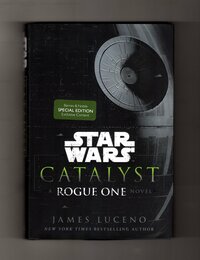Take a photo of a barcode or cover
This is just a book o' backstory. It's not very exciting (nor is it very memorable) but it provides a lot of insight into certain characters from Rogue One. I wish I'd finished reading it before seeing the movie, but at least it'll enhance future viewings.
Good Star Wars book that gives some backstory and character insight for rogue one.
Catalyst details the manipulations of Orson Krennic to recruit Galen Orso in building the Death Star. Galen Orso, father of Jyn Orso (protagonist from Rogue One), is a brilliant scientist whose primary research focus is on kyber crystals.
Kyber crystals have long been used by the Jedi to power lightsabers. They contain massive amounts of energy, and Galen has a dream of providing renewable energy to far flung worlds. His wife, Lysa, is a constant support to his endeavors.
Orson is an old friend of Galen. Although he doesn't have the same level of intelligence, Orson has high political aspirations, and his drive has pushed him to more career success than Galen. He's obviously power hungry, which bothers Lysa, although Galen has a hard time seeing through it.
In the beginning of Catalyst, Galen and Lysa are on Vallt, working for Zerpen Industries. He's arrested for no apparent reason initially. During the captivity, Jyn is born. They are told Separatists are to blame, and Orson Krennic sends a pilot, Has Obitt, to bring them to Coruscant.
Orson knows Galen will never agree to work on the Death Star, so he manipulates Galen to do the research under different guises.
Throughout the book, Orson's maneuverings display his obsession with the Death Star and his want to be in power.
A large portion of this book is really boring. From Galen and Lysa's arrival on Coruscant up until Mas Amedda stops Orson's "resource plan," I found myself having trouble concentrating.
There is very little action until the end of the book. There are some politics, but it's mainly the squabbling between Orson and Tarkin, so the view is more focused.
I really enjoyed Lysa, and I thought Orson's character was well described. However, too many of Orson's early maneuverings in the book were somewhat obscure, so when later they were revealed, I was more focused on the current events, rather than thinking back to the earlier events, simply because by the end of the book it was more interesting.
Has Obitt provided a nice relief from the tense chapters of Galen and Orson. I wished he had a more prominent role throughout. His early chapters felt rather wasteful, since they were so slow.
I had hoped this book detailed Jyn's teenage years, but the book stops right when Galen and Lysa arrive at the new planet.
If you really want some background on Galen Orso and Orson Krennic, and the use of kyber crystals in the Death Star, then I would recommend this book. Otherwise, you may be bored with most of it.
Kyber crystals have long been used by the Jedi to power lightsabers. They contain massive amounts of energy, and Galen has a dream of providing renewable energy to far flung worlds. His wife, Lysa, is a constant support to his endeavors.
Orson is an old friend of Galen. Although he doesn't have the same level of intelligence, Orson has high political aspirations, and his drive has pushed him to more career success than Galen. He's obviously power hungry, which bothers Lysa, although Galen has a hard time seeing through it.
In the beginning of Catalyst, Galen and Lysa are on Vallt, working for Zerpen Industries. He's arrested for no apparent reason initially. During the captivity, Jyn is born. They are told Separatists are to blame, and Orson Krennic sends a pilot, Has Obitt, to bring them to Coruscant.
Orson knows Galen will never agree to work on the Death Star, so he manipulates Galen to do the research under different guises.
Throughout the book, Orson's maneuverings display his obsession with the Death Star and his want to be in power.
A large portion of this book is really boring. From Galen and Lysa's arrival on Coruscant up until Mas Amedda stops Orson's "resource plan," I found myself having trouble concentrating.
There is very little action until the end of the book. There are some politics, but it's mainly the squabbling between Orson and Tarkin, so the view is more focused.
I really enjoyed Lysa, and I thought Orson's character was well described. However, too many of Orson's early maneuverings in the book were somewhat obscure, so when later they were revealed, I was more focused on the current events, rather than thinking back to the earlier events, simply because by the end of the book it was more interesting.
Has Obitt provided a nice relief from the tense chapters of Galen and Orson. I wished he had a more prominent role throughout. His early chapters felt rather wasteful, since they were so slow.
I had hoped this book detailed Jyn's teenage years, but the book stops right when Galen and Lysa arrive at the new planet.
If you really want some background on Galen Orso and Orson Krennic, and the use of kyber crystals in the Death Star, then I would recommend this book. Otherwise, you may be bored with most of it.
The audio book for this was fantastic! Worth the three month wait at the library. Seriously, it was a close to an audiodrama you can get with a book as a script. The sound effects are fantastic!
I also liked seeing more back ground on characters from Rogue One like Jyn's parents, and especially Saw Gerrera. While not necessary for the movie, it was a great read!
I also liked seeing more back ground on characters from Rogue One like Jyn's parents, and especially Saw Gerrera. While not necessary for the movie, it was a great read!
I was definitely not a fan of this book. I found the story to be pretty weak. Galen and Orson were also not very thrilling characters, I was more excited when Tarkin would make an appearance! This book serves as a prequel to Rogue One and is basically how construction on the Death Star and its weapon began, and it really felt more informative than anything else.
it’s just so slow :((( i’m sorry rogue one nation
So thrilled to read a post-Disney SW book by Luceno!
I really enjoyed this. Gives a lot of context for Rogue One and Jyn's life.
Almost against my will I kinda liked Orson Krennic and his incredibly manipulative, unrequited pining for Galen Erso. (like as in, he's an entertaining character. A good villain. He's still awful and I want him to leave them alone)
Lyra is sadly more of a secondary character and I really wish we'd gotten more about her cause from what we do learn she is fucking awesome.
Almost against my will I kinda liked Orson Krennic and his incredibly manipulative, unrequited pining for Galen Erso. (like as in, he's an entertaining character. A good villain. He's still awful and I want him to leave them alone)
Lyra is sadly more of a secondary character and I really wish we'd gotten more about her cause from what we do learn she is fucking awesome.
A great prequel to the movie Rogue One. It does a great job of teasing the movie without feeling like its necessary to read this before watching the movie. We get a lot of backstory with Jyn's parents and the villain, Orson Krennic, who is awesome. His rivalry with Tarkin makes him even more interesting and his friendship with Galen is just so Star Wars. We also get a peek at Saw who was in the Clone Wars show and will be in Rogue One.
"Galen Erso is destined to join our project. He just doesn't know it yet."
Orson Krennic, p.100
Last year, when I reviewed [b:Bloodline|27209239|Bloodline (Star Wars)|Claudia Gray|https://i.gr-assets.com/images/S/compressed.photo.goodreads.com/books/1454615589l/27209239._SX50_.jpg|47250749], I mused that Star Wars prequels often tried to tell a complex story in an essentially simple universe. At the end of the year, however, I was compelled to rethink this assessment with the release of Rogue One, probably my favourite Star Wars film released in my lifetime. The film added nuance and depth to the universe in a way I hadn't quite expected, and grew to appreciate more and more as I further reflected on the film. Thus, I decided to venture back into the new expanded universe and read the prequel's prequel, Catalyst. The results were disappointing.
Catalyst begins with Galen Erso working as a researcher on energy development for a private company towards the beginning of the Clone Wars. His wife, Lyra, is pregnant with a daughter, whom they will name Jyn, for some reason. The story then proceeds to hop across days, weeks, months and years, occasionally commenting on events known from other Star Wars media, but never in much detail, and (I felt) almost as a courtesy rather than a necessity. Perhaps the most obvious example of this is that despite the focus of Galen's research being the kyber crystals that the Jedi use to construct their lightsabers, and despite Lyra's apparent devotion to the Force, the impact of the destruction of the Jedi is barely mentioned as it happens - Galen takes it almost entirely in his stride - and never quite seems to be as much of a factor as it really ought to have been in any of their actions. What I felt should have been a key factor, a turning point, of the story, seems largely glossed over, as if it's an inconvenience to the story that is being told.
A result of the hopping from event to event is that the story fails to achieve much momentum until it is very near its end. For the first third, roughly the time between Attack of the Clones and Revenge of the Sith, this lack of momentum might be acceptable as events are largely being set up; it is in the second third that I really felt it began to drag. By the final third there is some momentum, as we have events that actually closely follow on from one another as well as some actual action. These parts of the novel make me realise that James Luceno probably could have written a solid novel, but perhaps the teleological forces of writing a tie-in novel resulted in something less than it might have been.
The part of the story that are successful is the development of the relationships between the characters - sort of. I came to understand, for example, Lyra's actions in her brief appearance in Rogue One in a way that the film itself does not develop. Krennic and Galen's relationship is somewhat interesting, but less of the focus I felt it could - and should - have been. The story begins long after the two meet, and their pre-existing relationship is integral to the plot - as it is in Rogue One. But what we do not get is a friendship begun that degrades; we must accept that the friendship exists as we watch it degrade. So not much is actually added to the storyline in Rogue One; there needs to be another prequel to show how Krennic and Galen became friends (I wouldn't read it). Similarly, Saw Gerrera's absence from much of the novel means that I don't know why Jyn would be entrusted to his care when her parents are out of the picture. And it's a shame, because Gerrera's appearances really lighten up the novel.
And then there's Orson Krennic himself, who is the real star of this novel. It is in Krennic's development that Catalyst felt most worthwhile to me, showing how ambition drove him to create the battle station for which he received little credit. Particularly noteworthy is how he takes the transformation from Republic to Empire in his stride, a factor that I might have enjoyed more focus on, to be honest. Between the lines, it's clear that the Empire suited him more than the Republic ever did; it's a shame that subtext wasn't more like text.
In part, I think that Catalyst could have added more depth to the characters who play a peripheral role in Rogue One, a film that itself adds depth to characters completely unseen in A New Hope. Alas, it largely fails to do so and I had the distinct impression that this was because no-one knew how to do so. There is a plot in this novel that everyone is working together on a big secret project, but absolutely no-one, even those at the top and its actual designers completely know what it's for. Perhaps there's a metaphor there for the wider Star Wars expanded universe project, but for Catalyst in particular: it certainly has great power and will devastate worlds that came before it, but we're not quite sure how (and we're not allowed to know everything we're working on).






